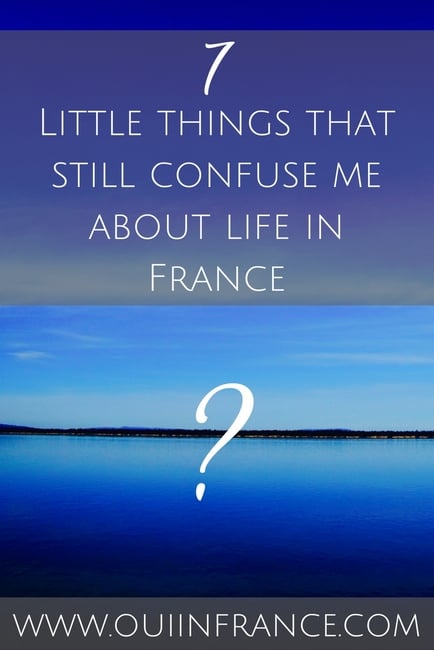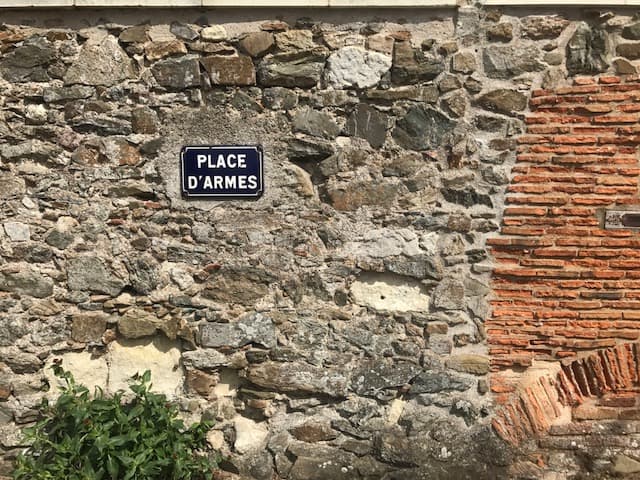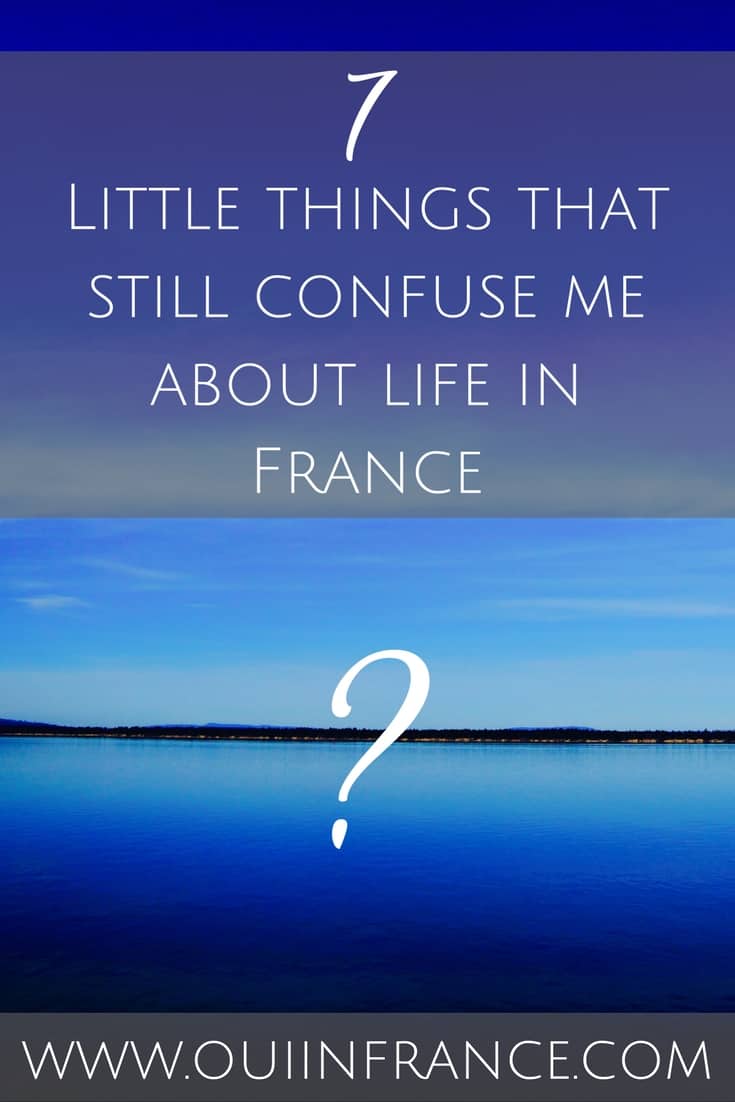I used to consider myself an on-top-of-things kind of person. I was pretty confident with myself and my place in the world when I was living back in New York City. I had a good understanding of adult things and was a fast talker and fast walker. Nothing about life in New York was really confusing.
But then I moved to France and I felt like my adult self was tossed back to infancy in some ways because everyday things would get super complicated, not to mention I’ve majorly slowed down. Today, five years into this living abroad thing, I still find a few little things about life in France a tad confusing. And I’m only half ashamed to admit it.
Let’s talk about confusing things about life in France.
7 French things I still don’t understand
There are many aspects of life in France that make so much sense… like cheap wine and cheese and that whole work/life balance thing. And then there are other confusing French things that will leave you scratching your head.
But hey, if these little things are the main things I find confusing, I guess life isn’t half bad. 😉
As with a lot of what I write here, this post is entertainment based on my cultural observations. Don’t take me too seriously — I don’t!
These days, I consider my day to be a win when I get dressed in normal clothes (the beauty of working from home is you don’t have to actually put pants on!) and talk to someone face-to-face other than my husband and dog beyond bonjour. A successful day is when I manage to go a full 24 hours without embarrassing myself with some cultural faux pas or language mishap.
Sometimes these confusing things about life in France get in the way:
1. How to write an address
Writing a French mailing address is more or less the same as writing an address in the US. You put the name (see point #2 below) on the first line, then the street name on the second and then the postal code and city on the last line. But that’s where the similarities end. Some people put a comma in between the house number and “rue.” Is it 8 rue du Colonel LeBlanc or 8, rue du Colonel LeBlanc? I have no idea what the “right” way is and see it both ways. Maybe it’s an option. In any case, my letters always arrive at their destination so no big deal.
2. Capitalization and order when you write first and last names
This one might top my list of things that confuse me about life in France. It seems that the French like to put their last names first on things like checks, credit cards, letters and other official things. Sometimes the last name will be written in all capital letters and other times it won’t be. You’ll often see First name LAST NAME. Other times you’ll see LAST NAME First name. Sometimes, but rarely, you’ll see First name Last name like we’d write in the USA — and it’s all too confusing!
Why is my last name capitalized and first on my carte bleue? Like Madame SMITH Jane. NO! It’s either Madame Smith or Madame Jane Smith, or if we’re being French, Madame Jane SMITH but not Madame SMITH Jane. Just no.
In the US, the only time you put your last name first is if someone is asking you to or you’re on a list alphabetized by last name. Otherwise, you’re First name Last Name. Or Mrs. Last name. I asked Tom why the last name is sometimes all capped (like we’re YELLING!), and he said so we can differentiate it from the first name.
Well, hey, guess what? It’s easy. We know the first name is first because that’s the traditional order of how you write your name. The first name comes first! Anyway, even French people do the capitalization thing differently. Depends on who you talk to.
3. Bonsoir/bonjour cutoff time
OK, let me preface this by saying as long as you don’t greet someone with “bonsoir” at noon, you’re fine. Generally, bonjour is hello/good day and bonsoir is good night. Seems simple enough, right? Well, not so fast. Sometimes around 6 p.m. when it’s still light out, I’ll greet someone with a bonjour just to be greeted back with a bonsoir. It’s not a big deal, but sometimes I just want to get it right!
In my defense, even French people don’t always agree on the cutoff time and it varies. Sometimes I’ll walk into the gym at 6pm (dark already) and some people will say bonjour and others bonsoir. Not sure one is more correct. Like I said, just don’t say bonsoir at noon and you’ll be fine. The important part is that you’re greeting people and not just ignoring them.
4. Celsius (but this is only half confusing. At this point I know the basics)
0 degrees C is freezing (32 F). So anything negative Celsius is quite cold. 20 and up is comfortable and anything above 30 is hell. I know the basics. But if you ask me what 72F is, I’d guess and say… 22 C. Am I close? (damn, I just looked it up and I was right on! Maybe temperature conversions aren’t so confusing to me anymore.)
5. Insurance and what is reimbursed
Sometimes medications and doctors’ visits are reimbursed in full or close to it and sometimes they are not (if you seek out a specialist on your own without being referred by your GP, the reimbursement isn’t the same). Also, meds like birth control pills are not reimbursed. Sometimes your reimbursements are in full and other times it’s a small percentage of what you paid. Supplementary insurance (mutuelle) will often pick up the remainder, but it’s not always so cut and dry to figure out.
I just know that no doctor’s visit or medical procedure will zero out my bank account. The full cost of an MRI a couple of months back was 78 euros and I think the sécu plus my mutuelle covered all but 3 euros of it. I never know what will be reimbursed upfront beyond simple doctors’ visits.
4 French healthcare myths you should stop believing >>
6. The phone politeness
I just got off the phone with someone who started off the call with, “Sorry to bother you.” She said this twice in a 1-min conversation (that could have easily been an email instead, but that’s another issue). TWICE! I kid you not. If I had been in the middle of something, I wouldn’t have answered an unknown number. It takes a lot more than a phone call to bother me. I know it’s just a nicety and something you say, but still, you’ll hear this “sorry to bother you” thing a lot — people even say it to employees who are working in a job where they are paid to help customers.
In my opinion, it comes across as over the top and is just something you say that you don’t really mean. The overall politeness can be its own topic on this list of things that confuse me about life in France, so read this post on politeness for more.
7. Emergency phone numbers
I’m embarrassed to admit that right now as I type this, I am not 100% sure what number to call on my phone in the case of a true emergency. Back in the US for any emergency, you’d call 911. Whether it was a police, medical, or fire emergency, the operator would be able to send you help. Some areas have specific numbers for different types of emergencies, but when in doubt, call 911 in the USA and your call will get routed appropriately.
Here there seem to be five different numbers depending on whether there’s a fire, car accident, criminal activity, etc. Talk about confusing things about life in France, right? I just can’t commit the French emergency numbers to memory, so I saved them to my phone instead. Just in case.
For the record, the number for emergencies in Europe is 112 (I’m going to forget that in about a day, I’m sure), but if you want the police it’s 17 in France. We found that out a few years back after seeing kids throwing rocks over an overpass and when we called 112, they told us to hang up and call the police emergency number. Yeah, I should tattoo all that on my hand.
Now there’s even a new non-emergency number for after-hours medical care (only in 3 regions at the moment).
So will 112 always get you routed appropriately in the case of an emergency? I hope so, but I really have no idea since when we called 112 that one time, they had us hang up and call someone else.
Here are all the emergency phone numbers in France:
15: SAMU (medical emergency)
17: Police
18: Firefighters (pompiers are also paramedics and can respond quickly to heart attacks, etc.)
112: Europe-wide emergency number
114: Text-message emergency number for deaf/hard of hearing
115: SAMU social (domestic violence/care for homeless in winter)
116000: Missing children
119: Social services (mistreated children)
191: Aeronautical emergency
196: Maritime emergency/coastguard
197: Terror/kidnapping hotline
***
Do any little things still confuse you where you live? What are some things that confuse you about life in France (or life abroad in general)?
PIN ME:








I love that last names are capitalized here in France. When you have a two-word last name like I do, people often get confused – is my last name Sickle or Van Sickle? When it’s all capitalized I don’t have that problem.
So here’s what I don’t understand: what the heck is that triangular road sign with a big exclamation mark in the middle of it? An expression of general French enthusiasm? (unlikely) Happiness that tomorrow is yet another French national holiday? (maybe) It’s a mystery.
Yes, in your case I can see how the capitalization thing is helpful. But what I don’t get is if we’re already writing the last name in all caps, why does it have to sometimes come first??
Also, Taste of France below replied about your sign question. Thanks for your comment.
When I read your comment about the road sign, I couldn’t help but thinking of a similar experience my wife and I had while driving recently for the first time in France. The sign that confused us was the triangle with what appeared to be a mustache inside. Warning, mustaches ahead? We couldn’t figure it out at first, until we released it meant speed bump ahead. Mystery solved (at least we think!).
Going to google this mustache thing. Sometimes roads have speed bumps/hums, not full blown bumps but raised areas that are aimed at getting you to slow down. I like that you call it the mustache sign. Gonna now use that too.
This, right?
http://www.alamy.com/stock-photo-five-mile-an-hour-speed-limit-with-speed-bumps-sign-in-a-residential-37124923.html
I often see addresses written as “Rue du Marché 103,” with the building number after the street. So it makes sense, when putting the number first, to put a comma. Well, at least I could justify it. Kind of.
I have been greeted with “bonsoir” at 2 p.m. So I guess you can say what you want after noon.
The emergency phone number thing is indeed confusing.
I also hate the intersections with priority on the right, when the car on the right wants to turn left but they have to wait for traffic on THEIR right. Some of them block the cars to their left, which I think is a jerk move. Once you stop, you lose priority, so since they have to wait, technically the cars to their left get to go. If the car waiting on the right hasn’t pulled out so far that there isn’t room. Anyway, it’s a mess.
To Keith: that triangular exclamation-point sign means “warning!” or “beware!” Also appears in text.
I think it’s even more confusing to put the street number at the end. What if there’s an appt as well? So Rue du Marche 103 Appt 104. AHHH!
You bring up a valid point re: priority to the right. I hate the silly rule as it is and if you need to turn left, it holds everyone up.
I loved this post! As a French woman living in NYC, I’m confused by exactly the same things… the other way around.
Here I know I shouldn’t say “sorry to bother you” all the time, but I do it anyway. And I can’t bring myself to write my first name first ! (The date format is a problem too, I always have that moment of doubt…)
Thanks, Laure! Comforting to know you struggle with the same things!
I think erring on the side of caution and saying “sorry to bother you” is always welcome and no one would fault you for saying it. It’s better than approaching someone and just asking a question without even saying bonjour!
As a foreigner, the sorry to bother you thing is just something I notice and my ears perk up but it’s never unappreciated. That said, I think it should be reserved for times when you are actually bothering someone. Like NOT when an employee is paid to help customers. Or when you call someone who you’re doing a favor for. It’s like people who say sorry for doing nothing wrong — don’t say sorry!
How long have you been in NYC now? Hope you like it 😉
Omg about the emergency numbers! One time (no, several times), I have called for an emergency (once for a friend who had fainted and once to report domestic violence) and both tiens I was told, sorry that’s not our domain, call this number. That is still so WTF!?!? To me. I wish there was one General number or the operators did their job and rerouted us. What if it had been a true emergency??? Argh.
Yes about last names. I can’t stand that.
🙂
See, that’s just a waste of everyone’s time. Not that I’m so busy and can’t manage to dial another number, but I’m arguing on the principle of it. It’s ineffective. And if there were a real emergency, not sure I’d be calm enough to comprehend what the person is telling me and then go ahead and dial some other number. ugh.
The last name thing is just so silly. I was fine (almost fine) until I got my carte bleue and saw Madame LAST NAME First name. NOOOOOOOOO
Concerning capitalizing the names : I like it because as Tom said it helps to know which is the first name if someone is called Tom HUBERT for instance. If someone is called Tom Legrand, you know that Legrand can’t be his first name, so it’s not necessary to capitalize it (but I’d do it anyway because it’s the norm, and also as my handwriting is not easy to read I prefer taking precautions lol)
Concerning bonjour/bonsoir, I think you shouldn’t concern to much about that, because it depends more of the “mood” of the person you’re talking to : if it’s someone who started his work at 4am and ends at 3pm, he may greet you with “bonsoir” at 3pm because his day is over (it’s a bit of an extreme example, but shopkeeper often says bonsoir to me at 5pm)
Everyone makes that “mistake” because it depends on your own feelings about the time of day, there’s no determined answer I think 🙂 But you can’t go wrong by saying bonjour when the sun is up and bonsoir when it’s dark or getting dark 😉
Right, but the first name is first, thus no confusion. If your name is Tom Hubert, well when he writes his name he writes Tom Hubert. Not Hubert Tom. It’s clear in American English at least that if he’s writing his name on a paper (doctor’s office sign-in form, school homework, a list of some sort, etc.) as Tom Hubert, his first name is Tom. Makes perfect sense to me!!
I guess I sort of understand the French way; I just don’t like it. But really, this post is all in good fun. It’s not that serious.
Appreciate your insight, Aurore!!
Diane, after watching French people do the “bonjour” and the other respond “bonsoir” to each other, I quit worrying about it. If they will greet each other with the opposite one, there’s clearly (to me) no firm rule and once it’s about 4 PM until dark, I use either one and don’t worry about it.
In regards to the name, it drives me crazy as well, BUT I now like the capitalization. I have a male first name as my last name, which means that, if I don’t capitalize, half the time people assume that I’m a man when I e-mail them. As you say though, this was NEVER an issue in the US – my first name is first and clearly female!
Oh my gosh, I had no idea Brooke was a man’s name in France! About bonjour/bonsoir, yeah it’s no big deal. Just a list of little things that really aren’t very important in the whole scheme of things. Well, maybe emergency numbers. Those are important! 😉
I don’t know why I didn’t see the response! My first name isn’t a man’s name (well, it can be without the “e”), but my last name is a common Scottish male first name. Since Brits are much more common here, both the Brits and the French have mistakenly thought my last name was my first name and that I was a man!
What I’d like to know about addresses is… what is bis? I even asked my tutor and she couldn’t explain it!
I really should put all those emergency no’s in my phone too, we’ve got just one here, 999, easy.
I’d better learn that phrase, ‘sorry to bother you’, I might be needing it quite often this year.
Hi there, so my official non-French person understanding of bis is as follows. Maybe one of my French readers can confirm:
Basically, it’s like saying 5A. So you have house or apt 5 and then 5A and then 6. It’s just an add-on to the street number. I think this is the case for a few reasons. When houses were built and land was divided back in the day, street numbers were assigned and then for a variety of reasons, new houses and apts were built. So maybe someone put an addition on their house creating a separate apt with a separate entrance, needing a street number. Or someone sectioned off their land and built another house on it. Instead of changing everyone’s street # which was already established, they just added bis to not disrupt everything. So you have house 5, then 6 across street, then 5bis next door. Maybe the land was divided at some point, something like that.
There are probably other reasons as well. The bis isn’t always the same owner either. Many times it’s not — house 5 has a family and house 5bis is someone completely unrelated. And you say it beesse. Not like bees, the insects that sting, but the ss sound in kiss or boss. Hope that kind of helped!
Sorry to bother you is desolee de vous deranger. I say it all the time but half smiling because it’s such BS.
Also, next time you’re down this way, email me so maybe we can meet up!
Hi Fiona, just to add to my wife Diane’s thorough explanation, don’t even be surprised if one day you come across a “ter” or a “quater” (that last one being more rare), it works the same way as the “bis” and in case of street numbers they mean “third” and “forth”. Those terms (bis, ter, quater, quinquies and so on) are mostly used in legal texts. Hope it helps 😉
Hi Diane,
Interesting article! For the addresses, the correct form is actually with the comma but nowadays, many people just drop it. For the second point, there are people in France who’s surname is “Antoine” or “Michel” etc, so that probably explains why surnames are written in capital letters. And for the Bonsoir/Bonjour, people usually start saying bonsoir in the late afternoon at around 5pm even when it’s still light. In winter, they might even start saying it at 4pm!
Anyway, hope that was helpful!
Have a great day,
Lisiane
Thanks Lisiane, makes sense! I’m still being stubborn about the last name capitalization thing. See my reply to Aurore below. We know it’s the first name vs the last because the order in which it’s written!
Those emergency numbers are confusing as all hell, here down under you ring 000 one number and you get asked which service you need.
The name thing is also bloody confusing as well who writes their last name in capitals and the last name is written last that is why it is your last name
Sounds very easy and practical in Australia, I like it!
The capitalization thing reminds me of something that confuses me here – the order people write dates. In England it is day, month, year. Here in Canada it seems to be anyhow! Though usually the reverse of the above for important things but then not always!
Yeah, it can be confusing. I just remember in France, you say le 31 decembre. So 31/12/17. the day, month, year, whereas in the US (and maybe Canada? i don’t know) we say December 31. It’s easy to know what date someone has written when the day is over 12, but when it’s like 9/8 is that sept 8 or aug 9? I always take a minute to check because my brain defaults to the American way
I was always confused about what exactly would be reimbursed and why and how… but I didn’t stress about it too much since, as you said, you know it’s not going to bankrupt you. It took me two years to finally get my carte vitale but I had no problem paying 23 euros to go to the doctor. (Of course, once I got used to having my carte vitale I would whine if something wasn’t reimbursed! #brat) But wait, birth control is covered – my carte vitale used to reduce the cost by about 80%, and then when I got a mutelle that covered the rest. One of the things I hate most about the US is being afraid to seek medical care even for serious things because of prohibitive costs. (That being said, California does have a great program with free healthcare for people who qualify.)
I got so used to writing my last name in all caps that I had to train myself not to do it when I moved back to California. Also, I can’t count how many times Hugo has asked me, “mon first name, c’est quoi déjà ?” when filling out forms in English. It’s just not a French concept.
Also, thanks for sharing those emergency numbers! I could never remember them all!
Hello! Totally agree w/everything you said. And Tom would get confused w/the order of dates on forms in addition to the name thing. His middle name is Jean-Paul and he’s like, do I put that too? haha.
Your bc pill was covered? Or another type like a IUD (i almost wrote IED, not the same thing)? I don’t know why, but it seems certain generics might be covered? My pharmacist told me no birth control pills are reimbursed by the secu (only some mutuelles) so maybe the law changed? In any case, it’s not an exorbitant cost. Way cheaper than the US.
Hi!
Great article.
I am a french living in California and I am confusing few things too… like the dates, I have to think about it when the date is something like 2.4.17… Is it February or April???
Same thing for writing the address with the city and the postcode… which one is first (depending if I am writing to France or US).
And like you said, confusing with the Fahrenheit… I have some numbers I know. Outside this, I am totally lost ! LOL
Thank you! Glad to know you struggle w/the same stuff, but in reverse. 😉
Have a good day Diane … every region has their own habits. Glad to be in french, sometime i might go there and try new things you tell 🙂
Thank you for your comment! Where do you live now?
Great post! We live in France about three months a year for my husband’s work. I’m a writer, so I can take my job anywhere. Thank you for the emergency numbers! I have copied and pasted into my notes, as I’ve always wondered what I would do in case of an emergency. I’m glad to know Bonjour and Bonsoir info, because I usually wait till after 5 or 6 to use Bonsoir, but then sometimes a person replies with Bonjour, totally confusing me, so glad to know I shouldn’t sweat it! My French is still not very strong, but I learned desole for when I do crazy American stuff and need to apologize! Hahaha! Now I’ll try and learn the whole phrase you gave us. We live in Strasbourg, but travel different parts of the country, and I’ve noticed each area definitely has it’s own customs and charm. I do love France and am enjoying learning more each year. This is our third year, living here. Last year and this, in Strasbourg. Our first year was in Lyon. Thanks for sharing your French life!
I love Oui in France! Great post. I like the capitalization of the last name because it makes it more clear. I once saw a French magazine article about American basketball star “James Lebron”. Oops! Capitalization would have shown the French journalist which was his last name.
Thanks so much! Oh man, yeah I can understand that mistake because James is more commonly seen as a first name!
Another confusing thing I believe is that to say hello you do indeed say bonjour/bonsoir, but then when you want to say goodbye you say « bonne journée « /« bonne soirée » .
Furthermore, if you want to be « old school » polite, you need to add the name or the title of the person after : bonjour Madame, bonne soirée Tom, you can’t just blurt out bonjour/bonsoir. As a foreigner no one will fault you for just saying plain hello but them’s the rules.